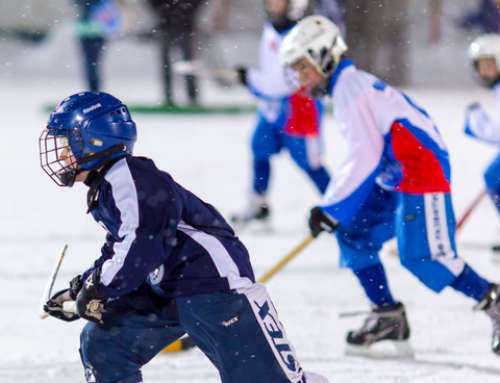It’s Thursday night. My hockey bag is over my right shoulder, my stick in my left hand. I’m racing into the hockey arena, looking for the name Dadson on the TV monitor to direct me to the Write-Offs changerooms. I swing open the dressing room door, and I see Jim Dadson fully dressed and ready to go with his clipboard in hand delineating teams. Welcome to Thursday night hockey with Jim and the Write Offs!
During my 16th year of organized hockey, I was beaten down mentally and emotionally more than physically. I didn’t find or express the same joy I had when I started the game. At the beginning, I was playing with friends, we all had fun, and feeling safe was never a question. Nearing the end, the focus became a competition, and safety blurred into fear and anxiety. Though I didn’t have the words then, I knew that a sport that once brought me nothing but peace and joy was no longer fun. When an athlete’s organized sporting life is over, it’s not uncommon to question your identity: if I’m not a [BLANK] player, who am I?
The first time I stepped on the ice with the Write-Offs dates back to 2006, as I was navigating this existential question. It’s hard to believe that I’ve shared the ice with Jim and the Write Off family almost every week for close to 16 years now, easily over 700 games. Typing that number surprises me; it’s hard to believe how quickly time flies! But, I guess that’s what happens when you’re having fun, and I’m grateful I found that again.
Growing up, I would often hear the saying, “you never know how valuable time is until it’s gone.” There are many areas of life where I experienced this, but Thursday Night Hockey was never one of them. It was there that I found peace and quiet within myself, which allowed me to participate and be present with those I played with fully. I knew how valuable Thursday Nights were, and as time continued to fly and my skates slowed down, I could see it even more vividly. I see Jim sneak up beside the net ready for a pass. I pass, and whatever happens next doesn’t matter because the point isn’t the point. The point is found when you can see your teammates.
My gut tells me Jim understood this, and beyond my gut, the evidence through his actions was crystal clear. Jim lived the quote on my friend Matt’s gym wall: “simple things done savagely well.” He was always the first at the arena, ensuring the dressing rooms were ready, water bottles filled, etc. At first glance, this may not seem like rocket science, but try doing this for over 50 years while radiating a sense of peace and joy.
Thursday night evolved from playing hockey to spending time with family. It surpassed the mundane mechanics of the game, and brought to life the spirit of the game. I find it difficult to define “spirit of the game” with words alone, because it’s an experience that requires your presence and participation. I remember asking Jim what his secret was to playing as long as he has, and he responded with two words: show up.
I remember losing my grandfather in September 2017. Our family had arranged a viewing on Thursday, so I missed hockey that week. I was standing at the front of the viewing room when I looked up and saw Jim in a full suit making his way towards me. I didn’t tell anyone from Thursday night hockey about my grandfather, but Jim found out in his own way, and he showed up.
Jim’s 50+ year on-ice relationship with hockey was the same secret behind his successful relationship with friends: he shows up. Many times I feel I need to do more than show up, I need to [fill in the blank], but what I’ve learned from watching Jim is that showing up positions us to react to people’s needs as opposed to our perceived needs. Showing up is truly a time-saver, a time savor-er.
One month after my grandfather’s funeral, my uncle Ted, who played many significant roles in my life, passed away. Around the same time, I was in the middle of contract negotiations for a new position, and Ted was always my go-to for these things. I remember thinking who I knew that I could trust to guide me, and Jim came to mind. At this point in time, I’d been playing hockey with Jim for 11 years, I had no idea what he did professionally, but I did know he was an honest man who respected time and his teammates.
We met at Tim Horton’s before our game. We sat there, and I talked, talked, and talked some more. He listened. I asked him how I should approach the financial discussion. I had a number in mind, and I shared it with him. I asked how he’d go about the negotiations. His response was simple, clear, and sensible: “Ask your boss what they are comfortable with.”
Interview with Jim Dadson
Nearing the end of 2021, Jim called me and gave me a heads up that he would be hanging up the skates for personal reasons at 79. The news hit me hard, but before the sadness could take over the mood of the conversation, he said, “Georges, this is the privilege of getting older.”
Georges: “Jim, what’s the secret of playing the game of hockey as long as you have?”
Jim: “Keep showing up.”
Georges: “How do you suggest I approach financial negotiations?”
Jim: “Ask what your hiring boss is comfortable with.”
Georges: “Jim, I’m really sad to hear this news. Are you sure there isn’t anything else that can be done….”
Jim: “This is the privilege of getting older.”
Jim’s lessons have continued to pay dividends. My main goal when it comes down to hockey is to show up, and that alone has paid off in more ways than I can mention. His advice around financial negotiations paid off too, literally! I received a higher split than the one I was preparing to negotiate for. And finally, Jim’s view of aging through the lens of privilege leaves me with hope.
Off the ice, Jim currently serves as the president and chair of the Deaf-Blind Ontario Foundation. After listening to his stories, I realized the most important lesson: hope can be found in our deepest challenge. Sometimes it requires us to slow down, look up, see our teammates or neighbors, and know we’re never alone.
To all the coaches, parents, and people working with the next generation, sport is bigger than a game, a score, or any other KPI. If our young ones are having fun and smiling through the wins and losses, then we’re living our calling.
RECOMMENDED FOR YOU
MOST POPULAR
It’s Thursday night. My hockey bag is over my right shoulder, my stick in my left hand. I’m racing into the hockey arena, looking for the name Dadson on the TV monitor to direct me to the Write-Offs changerooms. I swing open the dressing room door, and I see Jim Dadson fully dressed and ready to go with his clipboard in hand delineating teams. Welcome to Thursday night hockey with Jim and the Write Offs!
During my 16th year of organized hockey, I was beaten down mentally and emotionally more than physically. I didn’t find or express the same joy I had when I started the game. At the beginning, I was playing with friends, we all had fun, and feeling safe was never a question. Nearing the end, the focus became a competition, and safety blurred into fear and anxiety. Though I didn’t have the words then, I knew that a sport that once brought me nothing but peace and joy was no longer fun. When an athlete’s organized sporting life is over, it’s not uncommon to question your identity: if I’m not a [BLANK] player, who am I?
The first time I stepped on the ice with the Write-Offs dates back to 2006, as I was navigating this existential question. It’s hard to believe that I’ve shared the ice with Jim and the Write Off family almost every week for close to 16 years now, easily over 700 games. Typing that number surprises me; it’s hard to believe how quickly time flies! But, I guess that’s what happens when you’re having fun, and I’m grateful I found that again.
Growing up, I would often hear the saying, “you never know how valuable time is until it’s gone.” There are many areas of life where I experienced this, but Thursday Night Hockey was never one of them. It was there that I found peace and quiet within myself, which allowed me to participate and be present with those I played with fully. I knew how valuable Thursday Nights were, and as time continued to fly and my skates slowed down, I could see it even more vividly. I see Jim sneak up beside the net ready for a pass. I pass, and whatever happens next doesn’t matter because the point isn’t the point. The point is found when you can see your teammates.
My gut tells me Jim understood this, and beyond my gut, the evidence through his actions was crystal clear. Jim lived the quote on my friend Matt’s gym wall: “simple things done savagely well.” He was always the first at the arena, ensuring the dressing rooms were ready, water bottles filled, etc. At first glance, this may not seem like rocket science, but try doing this for over 50 years while radiating a sense of peace and joy.
Thursday night evolved from playing hockey to spending time with family. It surpassed the mundane mechanics of the game, and brought to life the spirit of the game. I find it difficult to define “spirit of the game” with words alone, because it’s an experience that requires your presence and participation. I remember asking Jim what his secret was to playing as long as he has, and he responded with two words: show up.
I remember losing my grandfather in September 2017. Our family had arranged a viewing on Thursday, so I missed hockey that week. I was standing at the front of the viewing room when I looked up and saw Jim in a full suit making his way towards me. I didn’t tell anyone from Thursday night hockey about my grandfather, but Jim found out in his own way, and he showed up.
Jim’s 50+ year on-ice relationship with hockey was the same secret behind his successful relationship with friends: he shows up. Many times I feel I need to do more than show up, I need to [fill in the blank], but what I’ve learned from watching Jim is that showing up positions us to react to people’s needs as opposed to our perceived needs. Showing up is truly a time-saver, a time savor-er.
One month after my grandfather’s funeral, my uncle Ted, who played many significant roles in my life, passed away. Around the same time, I was in the middle of contract negotiations for a new position, and Ted was always my go-to for these things. I remember thinking who I knew that I could trust to guide me, and Jim came to mind. At this point in time, I’d been playing hockey with Jim for 11 years, I had no idea what he did professionally, but I did know he was an honest man who respected time and his teammates.
We met at Tim Horton’s before our game. We sat there, and I talked, talked, and talked some more. He listened. I asked him how I should approach the financial discussion. I had a number in mind, and I shared it with him. I asked how he’d go about the negotiations. His response was simple, clear, and sensible: “Ask your boss what they are comfortable with.”
Interview with Jim Dadson
Nearing the end of 2021, Jim called me and gave me a heads up that he would be hanging up the skates for personal reasons at 79. The news hit me hard, but before the sadness could take over the mood of the conversation, he said, “Georges, this is the privilege of getting older.”
Georges: “Jim, what’s the secret of playing the game of hockey as long as you have?”
Jim: “Keep showing up.”
Georges: “How do you suggest I approach financial negotiations?”
Jim: “Ask what your hiring boss is comfortable with.”
Georges: “Jim, I’m really sad to hear this news. Are you sure there isn’t anything else that can be done….”
Jim: “This is the privilege of getting older.”
Jim’s lessons have continued to pay dividends. My main goal when it comes down to hockey is to show up, and that alone has paid off in more ways than I can mention. His advice around financial negotiations paid off too, literally! I received a higher split than the one I was preparing to negotiate for. And finally, Jim’s view of aging through the lens of privilege leaves me with hope.
Off the ice, Jim currently serves as the president and chair of the Deaf-Blind Ontario Foundation. After listening to his stories, I realized the most important lesson: hope can be found in our deepest challenge. Sometimes it requires us to slow down, look up, see our teammates or neighbors, and know we’re never alone.
To all the coaches, parents, and people working with the next generation, sport is bigger than a game, a score, or any other KPI. If our young ones are having fun and smiling through the wins and losses, then we’re living our calling.










